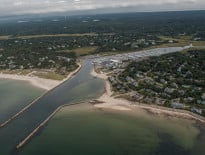The Federal Telecommunications Act of 1996 (TCA) brought major changes to the American telecommunications industry. As to wireless communications, the TCA is a legislative compromise designed to facilitate expanded service, while allowing local control over cell tower sites. Local authorities can regulate placement of towers, subject to limitations. Last May, the U.S. District Court for Massachusetts explained these limitations to a zoning board of appeals in Industrial Tower & Wireless, LLC v. Falmouth Board of Appeals.
Industrial Tower develops cell towers, leasing antenna space to wireless carriers such as Verizon and AT&T. When locating new towers, it seeks coverage gaps where cell phone users experience poor reception or dropped calls. In 2013, Industrial Tower found a significant coverage gap in East Falmouth along Route 28, Sandwich Road, Old Barnstable Road and John Parker Road, all of which carry abundant automobile traffic. It established a 1-mile diameter area containing 1,340 parcels of land where a suitable tower could be built. All but 18 of the 1,340 parcels were unsuitable because they were too small or had dwellings on them. Of the remaining 18 parcels, 17 were unacceptable. Those parcels lacked visual screening, adequate elevation or frontage, or they were encumbered by restrictive covenants or wetlands, were unavailable for sale or lease, or were situated within the “search and rescue” fly zone between Otis Air Force Base and Falmouth’s coastline, where towers are restricted.
One suitable parcel remained, a 20-acre property owned by the Midway Trap & Skeet Club of Falmouth. Industrial Tower hoped to build a 150-foot monopole tower there; however, Falmouth’s zoning bylaw required a special permit from the board of appeals. In October 2013, Industrial Tower applied for the special permit. The board referred the application to the Cape Cod Commission for approval, because a 150-foot monopole is considered a “development of regional impact.” After a five-month process, the commission approved the tower.
The Falmouth board of appeals then conducted its own review, requesting additional information. The zoning bylaw required the board to consider adverse effects that a tower might have on the neighborhood, as well as traffic impacts, availability of utilities and other criteria. The bylaw did not list the feasibility of alternative sites among the criteria for the board’s consideration. Industrial Tower provided the board with test drive data, dropped call maps, an independent consultant’s report, sound studies and visibility tests. Abutters predictably objected, and a divided board denied Industrial Tower’s special permit application in July 2014. Board members voting “no” expressed doubts that Industrial Tower could not find alternative tower sites. Industrial Tower appealed the board’s denial to the federal court for Massachusetts under the TCA, asking the court to vacate the board’s decision and order the board to issue the special permit.
The court summarized the TCA as generally allowing local governments to control cell tower placement. However, the TCA imposes limitations on local control. When local authorities deny permits for towers, their decisions must be supported by “substantial evidence” from written records. Also, local authorities cannot regulate tower placement in a manner that effectively prohibits wireless services. The court ruled that the board’s denial of the special permit disregarded both limitations.
First, the court noted that the board members who voted “no” based their decision on the possible feasibility of alternative locations, which was not a standard contained in the applicable zoning bylaw. Therefore, the board’s denial was not based on substantial evidence and, for that reason alone, Industrial Tower was entitled to a judgment overturning the board’s decision. Second, the court considered Industrial Tower’s data presented to the Cape Cod Commission and the board of appeals. The data revealed a significant coverage gap along heavily travelled roads, and proved that the Midway Trap & Skeet Club property was the only suitable site for a tower that could eliminate the gap. The board of appeals offered no meaningful evidence contradicting this data. According to the court, the board effectively prohibited wireless service over a substantial area when it denied the special permit. This denial violated the TCA.
The court vacated the board’s denial of the special permit, and ordered the board to issue all permits necessary for Industrial Tower to proceed with construction. Aggrieved abutters may eventually grow accustomed to the 150-foot monopole. In the meantime they should experience fewer dropped calls in their neighborhood.




 |
| 


